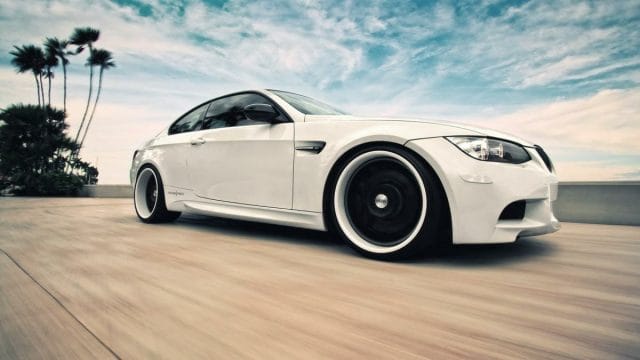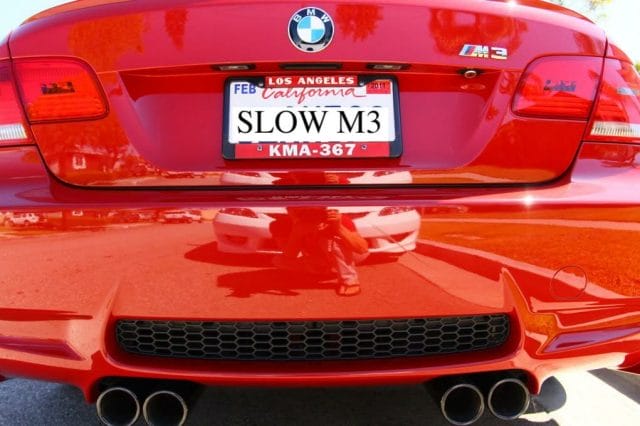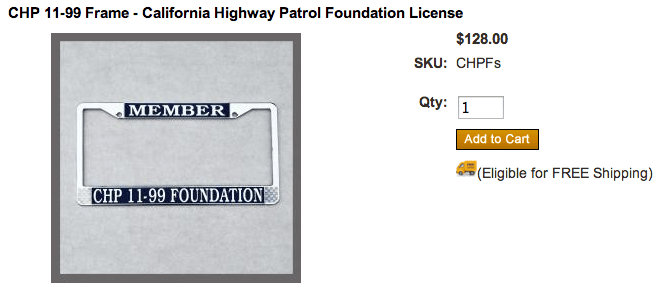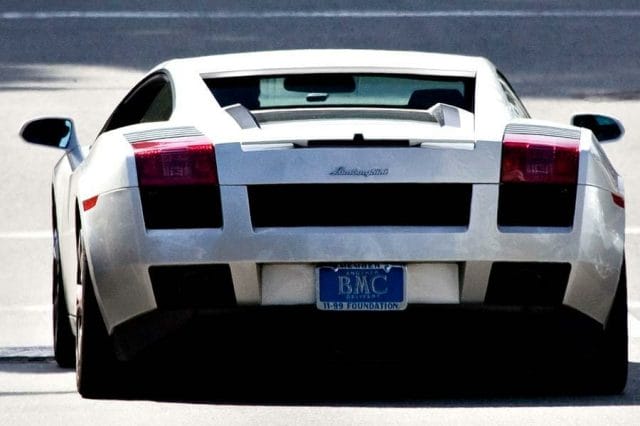
In the parking lots of Silicon Valley’s venture capital firms, expensive cars gleam in the California sun. Successful tech companies like Facebook may have set a culture of not flaunting wealth, but the Valley’s financiers don’t feel similarly restrained. The prototypical car is a Porsche 911, with its impractical two-door design that tells the world, “I have money to burn.”
A closer look reveals that the cars share a mysterious detail: they nearly all have a custom license plate frame that reads, “Member. 11-99 Foundation.” If you look for it, you’ll start noticing the same license plate frames on nice cars throughout the area. BMWs parked outside upscale Palo Alto restaurants have the plates. Sports cars zipping up and down Highway 101 do as well.
Are the Bay Area’s wealthy all part of some sort of illuminati group that identifies each other by license plate instead of secret handshakes? If the foundation is a charitable one, what cause has garnered such elite support?
The answer is the state highway patrol — the men and women that most people interact with only when getting ticketed for speeding. A number of the frames read “CHP 11-99 Foundation,” which is the full name of a charitable organization that supports California Highway Patrol officers and their families in times of crisis. Along with engraved mugs, jackets, and leather wallets, the foundation gives out the license plate frames as tokens of thanks to donors who become “Lifetime Members.” Donors receive one license plate as part of a $2,500 “Classic” level donation, or two as part of a bronze, silver, or gold level donation of $5,000, $10,000, or $25,000.
Rumor has it, however, that the license plate frames come with a lucrative return on investment. With a frame announcing that the driver has contributed a substantial amount of money to a fund that benefits highway patrol officers, donors believe that cops won’t give them speeding tickets.
“I have the ultimate speeding ticket solution,” a member of a Mercedes-Benz owners community wrote online back in 2002. “I paid $1800 for a lifetime membership into the 11-99 foundation. My only goal was to get the infamous ‘get out of jail’ free license plate frame.” A more recent post on a sports car site reads, “I have been stopped with the frame on my car only once, and I was let go. The officer specifically referenced the license plate frame as the reason he let me go.”
Which raises the question, can California drivers buy a license to speed?
An Old Story
The question of whether 11-99 Foundation license plate frames allow wealthy drivers to buy their way out of speeding tickets is an old one. The 11-99 Foundation has sold license plate frames for most of its 32 year existence, and drivers have been aware of the potential benefits since at least the late 1990s. But attention to the issue in 2006-2008 led the foundation to stop giving out the frames.
In 2006, a blog post about the frames entitled “Culture of Corruption” reached the top of the Google search results for the foundation, prompting representatives to contact the author. A police officer forum described the situation with the frames as “out of control.” An article in the LA Times asked “Can Drivers Buy CHP Leniency?” The article began by describing a young man zipping around traffic — including a police cruiser — and telling the Times that he believed his 11-99 frames kept him from receiving a ticket.
In response to the interest from the LA Times, the CHP’s new commissioner investigated the issue and described himself as “surprised” and “bothered.” He drew up a memo for the agency that stressed that no special consideration should be given to any drivers, and he contacted the 11-99 Foundation.
In September 2008, the 11-99 Foundation announced it would “phase out the distribution of Member license-plate frames to donors, effective January 1, 2009,” in order to protect its good name. No more license plate frames were given out for several years until, curiously, the foundation decided to bring them back.
Getting Out of Speeding Tickets: A Cottage Industry
Without the ability to purchase frames from the foundation, buyers turned to secondary markets. 11-99 Foundation donors had long sold extra frames on Craigslist, eBay, and forums for owners of pricey cars. The foundation’s decision made them an increasingly hot commodity.
But the decision was almost irrelevant to another thriving market: the production and sale of fake 11-99 license plate frames. Drivers who heard about the “speeding ticket insurance,” but didn’t have a few thousand dollars to spend on it, commissioned or bought fakes for under one hundred dollars a pop. “I was traveling south on the 101 yesterday and spotted at least three fake 11-99 foundation license plate frames,” one police officer shared on an online forum. “The first was TOTALLY fake like something a person had made at a swap meet or bought online for $10.” It’s “out of control,” another added.
11-99 license plate frames are prominent in the Bay Area where Priceonomics is located. But spending time on the sites where they are bought and sold reveals that they represent only one part of a gray market of license plate frames that people believe offer an insider’s wink to cops.
Many police departments give out or sell license plate frames with officer’s local radio call sign. Cops and their friends and family can use the frames on their personal vehicles, and many believe it lets officers know to be lenient on a fellow officer or his/her family. As a result, the secondhand market is full of license plate frames, fake and legitimate.

A BMW owner shows off his license plate with a LAPD call sign. Some frames are available only to officers; others are sold publicly. Since so many people make fakes or buy secondhand, many officers say they assume the owner is not a cop and may even be a criminal with something to hide.
One enterprising fellow shared his strategy for avoiding tickets: veteran license plate frames. Although he is not a veteran, the frames are sold publicly, so he buys them under the assumption that cops don’t want to ticket veterans. Others swapped stories of local police departments that gave out license plate frame stickers for each $100 donation.
If all else fails, speeders can cover their windows with “We support our local police” stickers. Although according to some officers, that can backfire, drawing police attention. “Somehow the cars that have [stickers] always lead to tickets/arrests,” one officer writes.
California drivers, however, no longer need to search out old 11-99 frames. The foundation once again offers license plate frames to donors. A frame can be had for a $2,500 donation; two for $5,000.
Does It Work?
If cops really are lenient toward 11-99 Foundation donors, it’s not a problem the police currently acknowledge.
When we called the Palo Alto police department to ask about the license plate frames around Stanford, an officer informed us that “most cops are familiar with the program,” but that the frames were never discussed in the department. (Local police departments wouldn’t necessarily be motivated by the frames, since the 11-99 Foundation exclusively benefits the state highway patrol.) The officer replied to questions about officers treating frame owners differently with standard lines about “patrol impartiality” and tickets being given “at the discretion of the officer.”
At the California Highway Patrol, Officer John Michael Harris told us that the perception of 11-99 frames as a license to speed is “not accurate at all.” To the foundation’s credit, Officer Harris said that the 11-99 Foundation told the highway patrol to report if any of their members attempted to use their status for preferential treatment so that the foundation could rescind that donor’s membership.
When we asked whether individual officers may take the frames into consideration, Harris replied with a flat “No” and stated that officers never give “preferential treatment based on affiliation.” Inquiring how the CHP could be unconcerned — despite the commissioner finding it necessary in 2008 to contact the foundation and remind officers not to give anyone preferential treatment — Harris repeated that citation decisions were impartial and “at the discretion of the officer.”
Owners of the license plate frames certainly believe that they are effective — although not 100% of the time. Posts on forums for sports car owners are full of people claiming to get out of tickets with the frame, and anecdotally people have shared stories of wealthy neighbors recommending the frames to avoid tickets. But it could be a false perception.
On Officer.com, in a discussion about 11-99 frames (and fakes) mentioned earlier, a number of cops weighed in. Priceonomics is still trying to verify identities, so their statements could be fabrications. But it presents an intriguing perspective of officers’ potential views on the 11-99 frames.
A number of cops reported ignoring the license plate frames when they decided whether to pull over and ticket drivers. One cop describes a driver whose “first words” were about the stickers indicating the donations he made. When the driver insisted that they required big donations, the cop replied, “Well, paying for these citations shouldn’t be a problem.”
But some answers indicate that people have reason to believe that the frames will help them avoid tickets. In addition to the frames, the CHP 11-99 Foundation gives out membership cards to big donors. In reference to secondhand or fake frames, one cop wrote, “Unless you have the I.D. in hand when (not if) I stop you, no love will be shown.” Another added, “Ya gotta have more than just a license plate frame or a sticker.” The implication from these officers seems to be that buying a fake license plate frame is useless, but real donors will receive some leniency.
The Road is Paved with Good Intentions
The 11-99 Foundation’s announcement in 2008 that it would no longer provide license plate frames did not cite donors motivated by a desire to avoid speeding tickets. It focused on the sale of frames on secondary markets in violation of the foundation’s policy that the frames are property of the 11-99 Foundation. The announcement complained that sites like eBay did not comply with requests to take down listings for the frames. Then president Edward Trickey stated that “it’s really important to block these sales, so we can prevent the frames from being misused, especially by people who don’t share the 11-99 Foundation’s goals.”
The idea that none of the foundation’s donors have an interest in avoiding speeding tickets — whether it works or not — and that only secondhand buyers see the speeding ticket insurance angle does seem like wishful thinking. Everything reported in this story is public knowledge, and the foundation’s own frequently asked questions page finds it necessary to stress that the foundation doesn’t simply sell license plate frames.

A reproduction 11-99 license plate frame available for sale on a license plate frame website
Yet this still seems to be the foundation’s official stance. After failing to reach the foundation’s CEO, administrative assistant Jenny Lawrence answered our questions. Ms. Lawrence told us that the foundation did not believe donors were using the plates to avoid traffic citations (in her words: it is “not something we are actively working to address at this point”), and she replied that the frames were brought back after a redesign rather than due to declining donations. Ms. Lawrence acknowledged that the frames were changed to no longer have the acronym “CHP” on the frame, but focused on the problems the foundation previously had with “people selling them online.”
No one is getting rich by selling 11-99 license plate frames, and the donations go to a well regarded cause. The CHP 11-99 Foundation has donated over $21 million in emergency assistance to the families of police officers, particularly officers killed in duty. If cops are being lenient, it’s not in exchange for donations to a slush fund.
But there’s not really an argument for keeping the license plate frames. The foundation says the frames play a valuable marketing role, but it doesn’t seem worth the negative perception. If they do function as a license to speed, it does a disservice to the highway patrol by allowing the wealthy to buy preferential treatment. And if they don’t, donors sincerely giving $2,500 or more should be just as happy with complementary jackets and mugs as a license plate frame.
We propose a simple experiment. The foundation could track down the owners of the Porsches and BMWs sporting 11-99 frames, explain the bad publicity the frames cause, and offer the donors a new 11-99 Foundation jacket in exchange for turning in their license plate frame. If they donated for good reasons, and use the plate to spread the foundation’s name, they should happily return the frame and put on the jacket as they head to their next meeting.
This post was written by Alex Mayyasi. Follow him on Twitter here or Google Plus. To get occasional notifications when we write blog posts, sign up for our email list.




